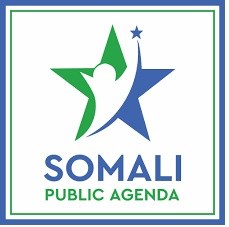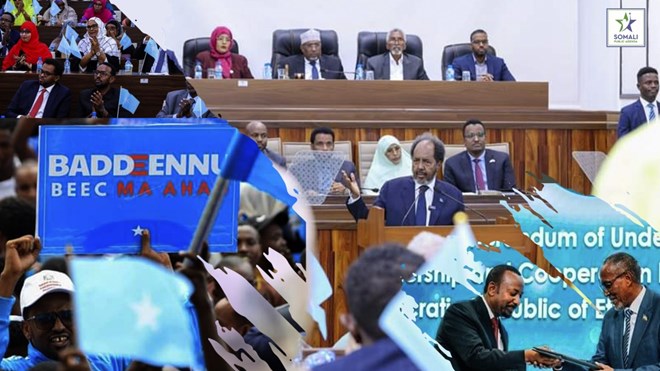
Friday January 26, 2024

The President of the breakaway Republic of Somaliland, Muse Bihi Abdi, signed a controversial Memorandum of Understanding (MoU) in Addis Ababa with Ethiopian Prime Minister, Abiy Ahmed on the 1st of January 2024. The details of the Ethiopia-Somaliland agreement have not been disclosed to the public, but several points can be gleaned from public statements by both sides. Ethiopia would secure a 50-year lease of a 20km (12 miles) base along Somaliland’s coastline designated for the use of Ethiopia’s naval forces. Although this has not been confirmed, this could possibly include the area surrounding Lughaye town in the Awdal region. Our understanding is that, as part of the deal, Ethiopia is also set to use ports in Somaliland for commercial import and export.
In return, Ethiopia may take steps towards recognizing Somaliland as a sovereign state, although exactly what this entails is unclear due to the contradictory statements of both parties. Secondly, Somaliland would potentially receive a stake in Ethiopian Airlines, which would be equivalent to the 50-year lease at the coastline and land. Indirectly, Somaliland would also be set to benefit from increased trade with Ethiopia. The parties to the MoU have emphasized different aspects of the deal – Ethiopian authorities have emphasized the military and commercial aspects, whilst the Somaliland authorities have emphasized the potential for recognition. Ethiopia also indicated that the negotiations had been ongoing for months.
The signing of the MoU has proved divisive and sparked a diplomatic crisis across the Horn of Africa (HoA) region. It also coincides with increased global tensions in the Red Sea/Gulf of Aden. Somalia’s cabinet held an emergency meeting on January 2nd and issued a resolution that nullifies the MoU. The parliament also drafted and approved legislation, which was subsequently signed by the President, nullifying the MoU. Several countries issued press releases supporting the territorial integrity of Somalia, as well as multilateral organizations, including the African Union (AU), the Organisation of Islamic Cooperation (OIC), the Arab League, the European Union (EU), and the United Nations (UN). Demonstrations against the MoU took place across Somalia, including in the Awdal region where Lughaye is located. Nonetheless, there was a protest in support of the deal in Hargeisa. Civil society organizations have led a range of online and offline discussions on the MoU in Somalia, as well as in Ethiopia.
Implications for Somalia
The Somaliland-Ethiopia MoU will have a number of implications for Somalia, including the prospects for renewed Federal Government of Somalia (FGS)-Somaliland dialogue, FGS-Federal Member States (FMS) relations, and wider FGS priorities on security and finalizing the constitutional review process.
Somalia-Somaliland talks: The signing of the MoU is likely to have immediate and future implications for the FGS-Somaliland talks. First, the MoU has contributed to divisions within Somaliland, particularly escalating long-standing grievances in the Awdal region. Local communities have felt excluded from the wider Somaliland project and are concerned about inadequate representation in the Somaliland administration. Notably, the Somaliland Minister of Defence, who hails from the Awdal region, resigned from his position in opposition to the MoU. This development, coupled with the conflict that erupted around Las Anod in the east in 2023, poses a threat to further political fragmentation within Somaliland. Furthermore, the MoU could negatively affect Musa Bihi’s prospects in the delayed November 2024 presidential elections. His popularity has dwindled since the outset of the Las Anod conflict and his reluctance to conduct the presidential elections on schedule. At the same time, there are speculations that Muse might have signed the MoU in an attempt to improve his image and boost his chances of re-election.
Second, the MoU has severely hindered the prospect of constructive dialogue and negotiation between the FGS and Somaliland. This signing of the MoU was an unexpected development, occurring shortly after a two-day meeting between the Somali President, Hassan Sheikh Mohamud, and Muse Bihi. Facilitated by the Djiboutian President, Ismail Omar Gelle, this had taken place only a few days earlier in Djibouti. The meeting, during which the parties agreed to resume dialogue and implement previous agreements, initially seemed like a breakthrough after several years without dialogue. Any optimism stemming from this meeting has since dissipated, significantly straining the relations between the two parties. The only prospect of restarting this discussion, at least for now, seems to involve nullifying the MoU and waiting for the outcome of the 2024 presidential election in Somaliland.
Federal Member States (FMS): The leaders of the FMSs have remained noticeably reserved on the issue. While most FMS leaders, with the exception of Puntland, participated in a National Consultative Council (NCC) virtual meeting with the FGS on January 2nd and jointly issued a press release denouncing the MoU, there have been no notable statements or advocacy from the FMS leaders on this matter. An exception to this has been the leadership of Banadir, which played a key role in mobilizing and coordinating a large demonstration against the MoU, which took place in Mogadishu on January 11th.
There are probably a range of reasons for this passivity including the continued presence of Ethiopian National Defence Forces (ENDF) in in Hirshabelle, Southwest, and Jubaland states, primarily deployed as part of ATMIS, coupled with the fragile and contested political settlement of most of the FMSs. Additionally, some FMS presidents have historically maintained close ties with Addis Ababa which could influence their stance on the matter. Moreover, FMS presidents who may seek to stay in power beyond November 2024, either through manipulated elections or extensions, may be considering seeking support from Ethiopia. Indeed it is possible that Ethiopia could capitalize on this situation and engage with each FMS individually to undermine Somalia domestically, a strategy that appears to be underway. The Ethiopia-Somaliland MoU could also have immediate security implications for some FMS particularly if the FGS prioritizes and requests a withdrawal of Ethiopian forces within ATMIS from Somalia rather than their planned withdrawal at the end of the year. This could potentially be a path that the FGS may consider if Ethiopia starts implementing elements of the MoU.
FGS priorities: The recent developments will also impact the FGS’s two key domestic priorities, namely, degrading al-Shabaab and concluding the constitutional review process, potentially slowing progress on both fronts. The FGS has been conducting ongoing offensives in Hirshabelle and Galmudug, with plans for a second phase of offensives in Southwest and Jubaland. These efforts are aimed at stabilizing the country ahead of the planned ATMIS withdrawal by December 2024. However, the new political crisis between Somalia and Ethiopia is likely to divert attention from the fight against al-Shabaab, which could, in turn, impact the timeline for the ATMIS withdrawal. Additionally, Somalia’s plans, communicated last year, to consider bilateral security cooperation between Somalia and “frontline states” including Ethiopia, opened up the prospect for a continued ENDF security presence in Somalia outside of an ATMIS mandate. However, this may now be politically untenable, limiting the range of options for a viable post-ATMIS security configuration in Somalia.
The MoU has the potential to divert the FGS from its other priority of finalizing the constitutional review process in 2024. The process has already encountered delays and obstacles, but the FGS had planned to bring the debate to the federal parliament early this year following the Independent Constitutional Review and Implementation Commission (ICRIC) submitted the revisions of the first four chapters to the Parliamentary Oversight Committee. The new Somalia and Ethiopia crisis is likely to introduce further delays or complexities to this process.
Opportunities for Unity and Political Settlement
Notwithstanding the multiple impacts the MoU may have in Somalia, it can also potentially be seen as an opportunity for enhancing unity and addressing fragility in Somalia’s political settlement. While the FGS has so far focused on diplomacy and public mobilization, it can leverage the MoU and the current crisis as a chance to foster domestic unity. The public protests against the MoU, which have extended to parts of Somaliland and the diaspora, can be harnessed to support and bolster broader political reform initiatives.
First, the FGS leadership should engage with the recently re-elected Puntland President Said Abdullahi Deni. Both the FGS and Puntland leadership should work towards resolving their differences, recognizing the common challenge that Somalia is currently facing. As a starting point for renewed dialogue and collaboration, the FGS president should consider attending the incoming inauguration ceremony of the Puntland President. This step can help as a starting point to open up dialogue on the previous National Consultative Council (NCC) agreements and potentially bring Puntland back into the NCC fold. Notably, the newly elected Puntland leadership has already issued a statement indicating their willingness to renegotiate the previous NCC agreements and requested to pause the constitutional review discussions to allow time for this. This presents a timely opportunity to return Puntland to the NCC.
Second, the FGS should convene a prompt meeting with members of the NCC, including Puntland, to engage in a comprehensive discussion about the security and political implications stemming from the MoU and the deal that is expected to follow, and how these can be effectively addressed. The meeting should also emphasize that FMS leadership should avoid bilateral engagements with Ethiopia as that would have a negative political and security impact. The NCC should propose a clear way forward on security implications of the MoU within FMS that need urgent attention as well as renegotiate and address the concerns of Puntland and opposition leaders around previous NCC political agreements. The way forward for the scheduled November 2024 FMS elections should also be discussed to promote stability.
Third, the leadership of the FGS should organize a meeting with key political stakeholders outside of the NCC, who have expressed concern about the most recent NCC election agreement. The meeting should discuss the current situation, the role politicians could play in tackling potential threats, and the political settlement questions that should be addressed as part of the constitutional review process.
Fourth, if Puntland re-joins the NCC, and a renewed understanding with political stakeholders on NCC agreements is reached, the parliament can spearhead the constitutional review process, based on widespread consensus. Unity and harmony among the FGS, FMS, and opposition politicians on internal political settlement matters would not only advance the completion of the constitutional review process but could also enable political coordination around the offensive operations against al-Shabaab as well as a unity of purpose in Somalia’s response to the new crisis created by the MoU.